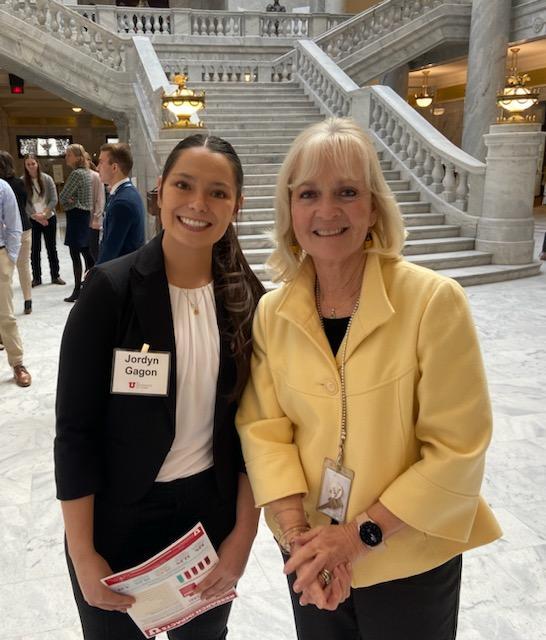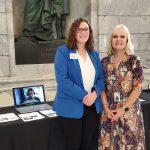Jordyn Gagon, a Price native and University of Utah student, (left) with representative Christine Watkins (right),
By Representative Christine Watkins, District 67
The last two weeks of the legislative session have been something I have not experienced in previous sessions. In the past, if there were bills that were deemed highly controversial, they were often put on the back burner to simmer throughout the session and then voted on in the last two weeks. This session, the two most controversial bills have gone through both houses and the governor signed them into law.
HB 215, the educational scholarship bill (voucher), and SB 16, the transgender bill, breezed through both the House and the Senate and were signed into law this past Saturday. The transgender law immediately stops any child from accessing hormone blocking drugs. If a child is already on these drugs, they will be allowed to continue their medical regimen. I am sure there will be lawsuits against HB 16. You can go to le.utah.gov and search under “bills” or type in the bill number to read the bills and see what they do.
On Thursday, I presented two bills in committee. The first one was HB 4 1st Sub. This bill is a request from the Indian tribes in Utah and many other state agencies. For decades, the tribes and the state have operated under the federal Indian Child Welfare Act of 1987. This act has allowed all agencies to cooperate when dealing with Native American children who end up in foster care.
The Federal Act was sued for discrimination, and it is now in the Supreme Court awaiting a ruling from the court. We believe this is a political issue. The Federal Act allows two sovereign countries to work together but allows the child’s country of origin to dictate to the child’s placement. In other words, if an Indian child needs to be in foster care, they should be placed with family or another tribal family. The lawsuit states that it is racial discrimination. Of course, the tribes do not believe that is the case.
The State of Utah wants to join ten other states who have placed the ICWA (Indian Child Welfare Act) into their state statutes. I presented the bill to the Judiciary Committee, and it was placed on hold. The Governor and Lt. Governor support this bill, so we are answering the concerns of those who do not.
I also presented HB 91, Election Signature Requirements, to another committee. This bill proposed dropping the signature requirements for five rural House Districts and two Senate Districts. The required signature numbers would be 50% less than what is required now. I knew it was a long shot, but I wanted to try anyway.
Most rural candidates do not use the signature route because the only company that you can pay to gather signatures does not go to rural Utah. Even trying to do it yourself is daunting at best. It was defeated, but at least it made urban legislators realize that this issue is also about fairness for those of us who represent multiple counties.
We are busy in Appropriation Sub Committees (think money). We only have a couple of weeks to listen to presentations by groups who want money to build, enlarge, start or maintain an entity in Utah. It is a hard year because we do have extra money. A substantial chunk of the money will be given in one-time appropriations.
I have not had a spare minute this year as many people have been requesting meetings and I have lunch over training sessions. I have tried hard to meet with my constituents. I especially love meeting the school groups and talking with them.
Cell: (435) 650-1969
Email: christinewatkins@le.utah.gov
Facebook: Representative Christine Watkins







